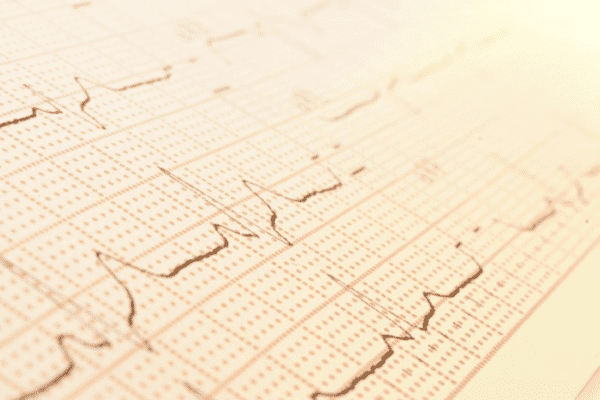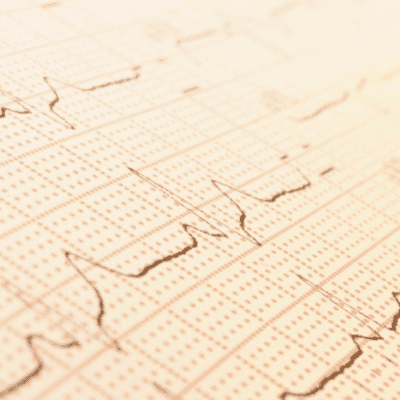What Is The Role Of EKG Testing
In Primary Care?

Charles Fazio
August 4, 2021
Share Article
An EKG is a standard test performed by a primary are provider that records the electrical activity of your heart in a matter of minutes. This noninvasive test is performed to catch underlying heart conditions that can lead to conditions such as: angina, occurrence of a prior heart attack, an evolving heart attack, heart disease, and more.
What To Expect During An EKG TEst
When receiving this heart test at a providers office, outpatient clinic or hospital, the patient will be asked by their health care provider to lay down in a comfortable position, and the doctor will attach sticky pads that contain electrodes to your chest and limbs. According to Medline Plus, in a standard EKG test, there are usually ten electrodes, which are connected with a wire that transmits the patient’s heart readings to a monitor.
After a few minutes, the electrical activity of your heart will have been recorded, and the result will be a readout similar to what you associate with a heart monitor – a thin line with peaks and valleys that represent your heartbeat. These readings are than interpreted by your cardiologist who uses them to determine if your heart is beating at an abnormal rhythm or is receiving the correct amount of oxygen.
Preparing For Your EKG
Most doctors recommend avoiding exercising or drinking cold water before your test. This is because cold water can cause changes in electrical patterns recorded during the test, and exercise can increase your resting heart rate temporarily which may skew the results.
Exercise And Stress Tests
Depending on your age, stage of life, genetics, and social risk factors, your health care provider may perform an exercise and stress test. Your provider will perform an exercise and stress test if you have symptoms of heart disease such as: shortness of breath, chest pain, heavy heartbeats, or irregular heartbeat. Looking at family history, these tests may also be recommended if your lineage has a history of heart disease, diabetes and other risk factors. If you are at risk of heart disease and looking to start a new exercise program, your provider will recommend having an EKG to determine if your heart is healthy enough for added stressors.
During an exercise / stress test, the patient will be hooked up to the EKG machine with electrodes as they partake in increased levels of physical activity on a treadmill. This is important because the extra “stress” put on the heart during heavy exertion mimics how the patient’s heart behaves during physical activity, which is often different than at rest.
EKG Testing Risks
When undergoing an EKG test, there is no risk to the patient’s health. Often times, patients will feel minor skin irritation or discomfort after the electrodes are removed. The EKG does not actually produce electricity, it only picks up on the readings that your body gives off and records them – so there is absolutely no risk of electric shock.
Although the services provided are identical to a traditional care model, uninsured patients who need consistent primary care services may find this option to suit their needs better while satisfying an affordable price point.
Abnormal EKG
Do not be afraid if your health care provider tells you that the results of your test are abnormal. An abnormal EKG can have many different meanings. Often times an abnormality is actually a normal variation of the heart rate (heart rhythm).
In other cases, an abnormal heart rhythm can be a sign of a medical emergency, such as a myocardial infraction (heart attack) or a dangerous arrhythmia. A doctor or health care provider trained in interpreting EKG’s will be able to determine if your symptoms need any further treatment.
EKG vs. ECG?
You may have heart electrocardiograms abbreviated “EKG” and “ECG”, but is there a difference?
Actually, both are correct terminology and commonly used in place of one another. You may notice that the English word electrocardiogram does not have the letter “k” in it, this is because EKG comes from the German spelling “elektrokardiogramm”.
Although a visit to the ER has extensive medical treatment options, this should only be used when it is an emergency situation.
What Is The Difference Between A Regular EKG And A Stress EKG?
Depending on the patient, the doctor or health care provider may feel that the EKG taken at a resting heart rate does not provide enough insight about the heart muscle. Similar to standard electrocardiograms, the ten electrodes will be placed on the patient’s chest.
The difference is, instead of being stationary, the patient will be asked to walk on a treadmill while the heart rhythm is monitored, with the speed gradually increasing over time until the patient cannot continue.
When patients have past records of experiencing chest pain, or have other risk factors such as congestive heart failure, previous heart attacks, or heart defects, the EKG will give the patients physician valuable data about heart health.
Primary Care At South Pointe Healthcare
South Pointe Healthcare does not currently offer EKG testing.
If you would like to see us for any other primary care physician specialties, please do not hesitate to reach out at (303) 665-8444 and schedule an appointment.
We utilize a unique multidisciplinary approach that combines primary care, chiropractic, physical therapy, and mental health counseling all under the same roof to improve the quality of life in our patients.
Take Charge Of Your Health
Primary Care, Chiropractic, and Mental Health -become a part of our healthcare family today!
*The material contained in this blog post is for general information purposes only. You should not rely on the material or information in this article to make any diagnosis or healthcare decision. Any healthcare decision that you make should be brought up with and agreed upon in conjunction with your primary care provider. South Pointe Healthcare at Coal Creek LLC in no circumstances is liable to any party for damages that may occur directly or indirectly from information or material contained in this article.



